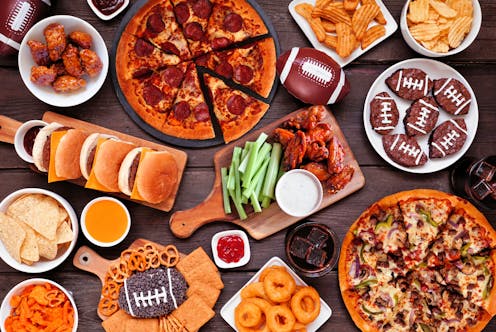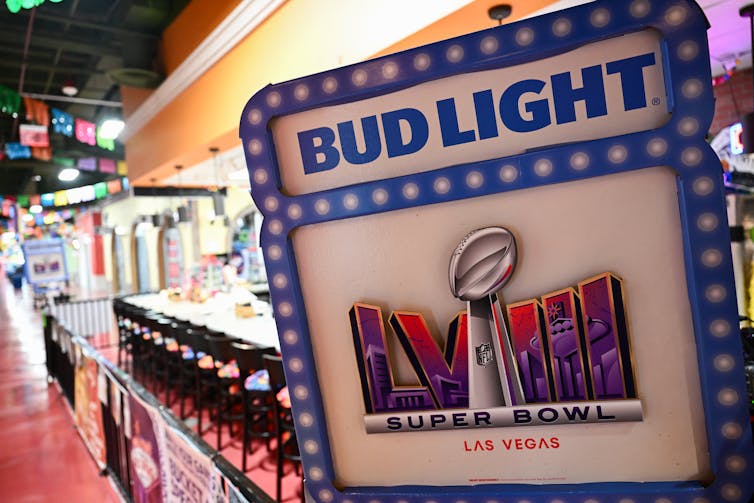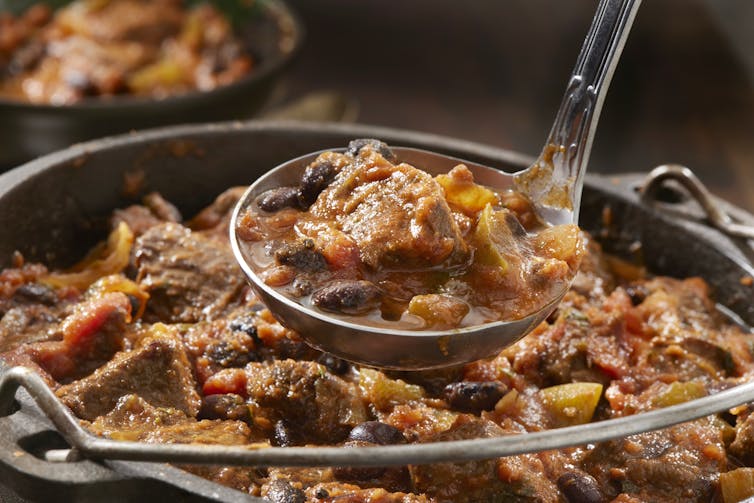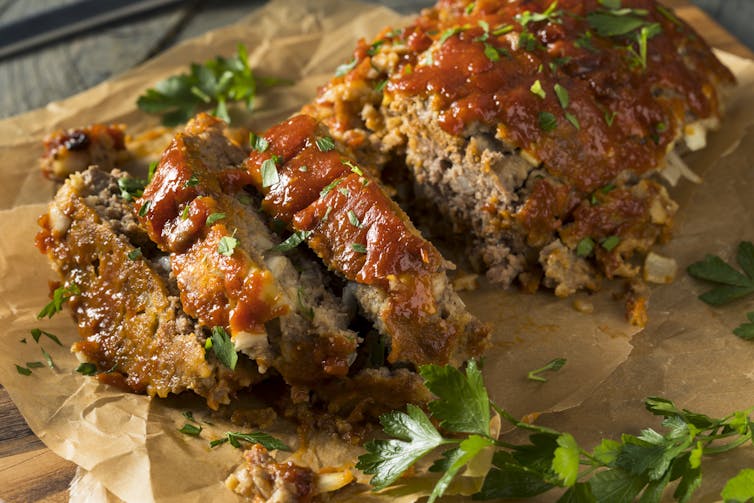Super Bowl party foods can deliver political bite – choose wisely
Polarization invades parts of Americans’ lives that really aren’t political, dividing society more deeply. That includes decisions about whether or not they like meatloaf or chili.

Conservative outrage over the presence of a female pop star at professional football games is a sign of how many parts of American life and culture have taken on a partisan political flavor.
Partisanship doesn’t just apply to opinions about the dating lives of Taylor Swift and Travis Kelce. Food, too, is another aspect of the latest set of not-quite-political conflicts – including beverage brands and main courses. What you serve at your Super Bowl party, or what the host serves at the event you attend, can now be interpreted, or twisted, through a partisan lens.
Our public-opinion research shows that almost nothing today is free of partisanship – whether the item in question has anything to do with government action, political ideology or public policy, or not. At times, the issues that erupt into political skirmishes are the result of fanciful conspiratorial thinking, blatant misinformation or just the personal preferences of political leaders.
We have found that these developments, in which polarization invades parts of Americans’ lives that really aren’t political, deepen existing divides in society. These conflicts also make it harder to have fun in mixed political company, and harder to steer clear of accidentally offending someone at your Super Bowl party.

An eye on Bud Light
Bud Light has long been one of the nation’s most popular beers. Politics has changed that.
In April 2023, transgender influencer Dylan Mulvaney posted a video to Instagram promoting a Bud Light contest. The anti-trans backlash was swift, with calls for boycotts of the beer coming from Republicans, including former President Donald Trump, U.S. Sen. Marsha Blackburn of Tennessee and U.S. Rep. Dan Crenshaw of Texas.
By June 2023, Bud Light was no longer the nation’s best-selling beer, falling behind Modelo Especial. The company that makes Bud Light, Anheuser-Busch, saw a 10% drop in revenue in the second quarter of 2023, which it attributed primarily to the conservative objections to a trans person being associated with the brand.

Making the nonpolitical political
In our book, “The Power of Partisanship,” we document that partisanship – psychological attachments to one of the two major political parties – in America has drastically increased since the 1950s.
We have found that more Americans identify as strong partisans than ever. We have also found that people’s political preferences are increasingly driven by negative emotions about the other party.
As a result of this increased partisanship, political leaders have more power than ever to introduce new issues and ideas into the public discussion, and use them divisively – even topics that have nothing to do with politics. And leaders’ views affect those of the public.
We found that this partisan phenomenon extends to food. For instance, Donald Trump likes meatloaf and Barack Obama likes chili. We surveyed people and asked them about their political views and their food preferences. Some of them we told of Trump’s and Obama’s preferences, and some we did not.
Democrats whom we told that Trump likes meatloaf rated that dish significantly lower than Democrats whom we had not told of his preference. Likewise, Republicans we told about Obama’s preference for chili rated it less favorably than Republicans from whom we kept that information.

Menu planning
So, when it comes to planning your menu, our research offers some advice.
For a party of Democrats, chili – possibly with an arugula salad on the side – is a safe bet. But meatloaf would be a better choice for a party of Republicans. You could reinforce those choices by accompanying the dishes with photos of the politicians with their favorite dishes.
Other foods also divide Americans. Consider steering clear of Coca-Cola if you are having Republicans over: The company criticized Georgia’s 2021 law that shortened early voting and made it more difficult to vote by mail.
If you order takeout, some Democrats might be reluctant to eat Chick-fil-A because of company leaders’ past opposition to LGBTQ rights and marriage equality. But more recently, it’s Republicans who have criticized the fast-food chain for hiring an executive focused on diversity, equity and inclusion – and for shifting the company’s donations to be less political.
In general, we recommend doing a quick online search to make sure you are up on your social network’s preferences of the day. That’s the best way, though not guaranteed, to avoid serving up something that has recently become politicized by partisan media or party elites.
You might not be up for that much work. Or perhaps you are one of the few Americans left with friends who identify with both political parties.

In that case, based on the research in our book, we suggest serving salmon or lasagna. Both are foods that appear to be resistant to partisan cues and are well-liked by members of both parties. Or maybe just throw a potluck, hope for the best, and you may even learn something new about your guests’ political views. Perhaps your guests will rise above partisanship and just enjoy the event.
The old advice to avoid talking about politics and religion in mixed company is evolving. For Americans, almost anything can be political now – from what’s on the table to what’s in the dresser or closet, and even what music we’re listening to.
When elites take positions, partisans follow their leaders. That means every cultural gathering, from the Thanksgiving table to the Super Bowl couch, can be invaded by political conflict. We don’t know about you, but we just want to watch the game.
Shanna Pearson-Merkowitz is a fellow at the Brown Policy Lab and has received funding for research projects from the USDA, the Russell Sage Foundation, and other organizations.
Joshua J. Dyck does not work for, consult, own shares in or receive funding from any company or organization that would benefit from this article, and has disclosed no relevant affiliations beyond their academic appointment.
Read These Next
Why ICE’s body camera policies make the videos unlikely to improve accountability and transparency
For body cameras to function as transparency tools, wrongdoing would have to be consistently penalized,…
50 years ago, the Supreme Court broke campaign finance regulation
A gobsmacking amount of money is spent on federal elections in the US. The credit or blame for that…
When civil rights protesters are killed, some deaths – generally those of white people – resonate mo
From the civil rights era of the 1960s until today, white victims of government violence have received…






